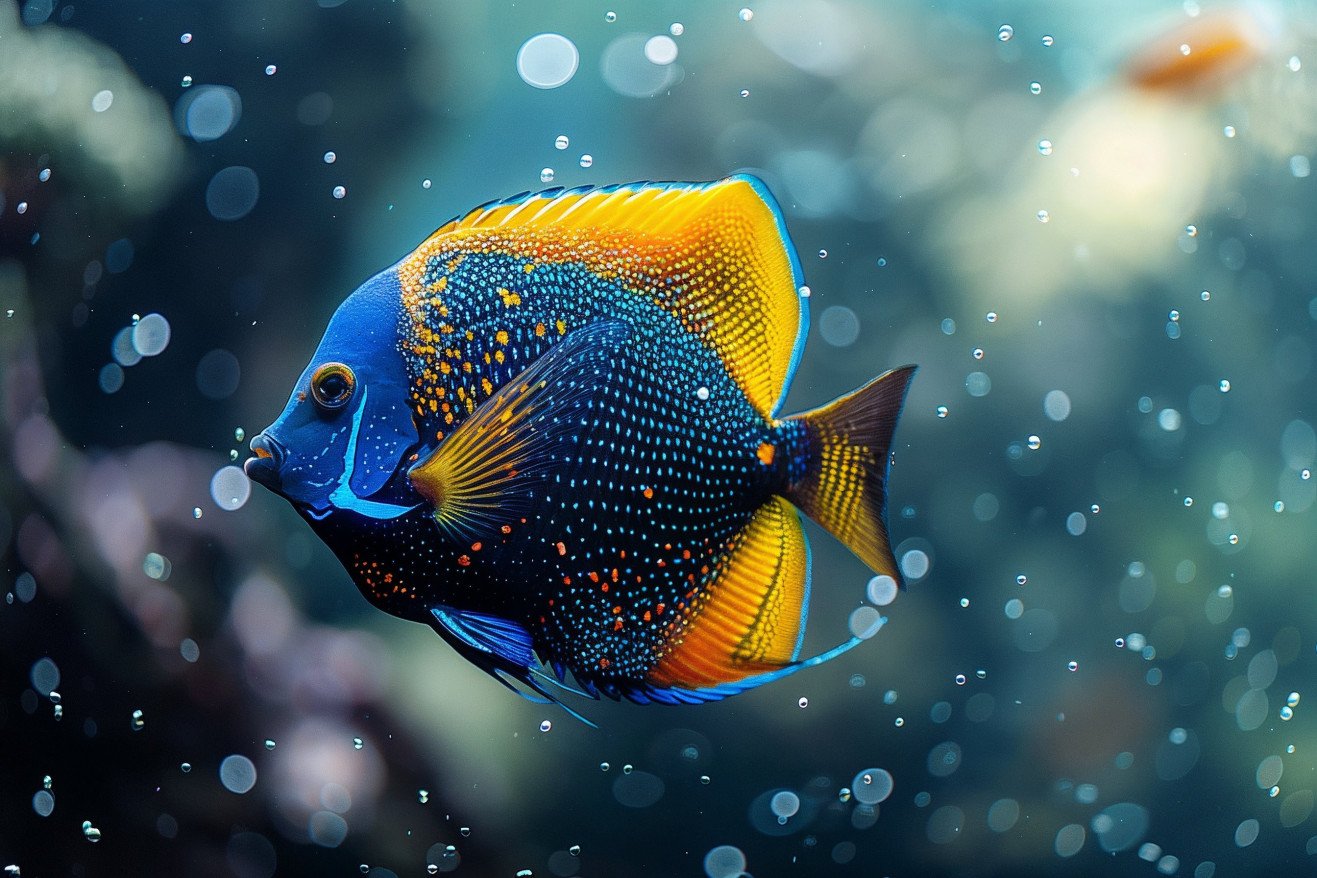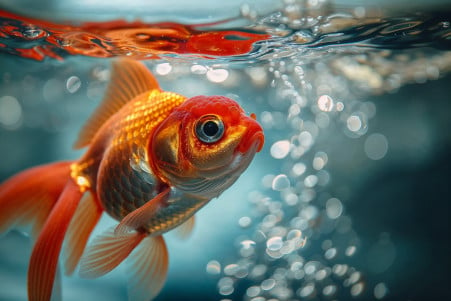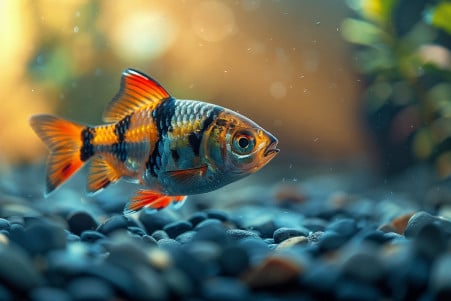Do Fish Poop? The Science Behind Fish Digestion
19 March 2024 • Updated 19 March 2024

Have you ever wondered about the digestive habits of fish as they gracefully swim through the water? Fish do, in fact, poop. Pooping is the common term for the waste excretion that occurs after fish eat and their digestive system breaks down food, leaving behind undigested materials that are expelled through the anus or cloaca. This is an important process that helps fish maintain their internal balance and overall well-being.
To learn more, we will draw from a range of fields, including marine biology, ecology, and aquaculture.
We will cover the anatomical and physiological details of fish waste excretion, the content of fish waste and its role in ecosystems, and the ways that waste is released in the water. This comprehensive approach will give you a well-rounded view of this natural process and how it fits into the larger picture of life in the water.
Do fish poop?
A Closer Look at the Digestive and Excretory Systems of Fish
The wide range of fish diets is reflected in the many different mouth shapes and tooth formations of fish. Predatory fish, for example, have long, pointed teeth that are perfect for catching and holding prey, while other fish have evolved special mouth shapes, like the parrot fish’s beak-like mouth, to help them feed on coral. These special mouth shapes are important for the first step of digestion, which is the mechanical breakdown of food.
Once food is ingested, it passes through the esophagus and into the stomach, where digestion begins. Fish have a wide range of stomach shapes, from simple tubes to complex sacs that help break down food.
From there, the liver and pancreas secrete digestive enzymes between the stomach and the intestine, where nutrients are absorbed through the folds and villi of the intestinal walls. According to Britannica, any undigested waste is excreted through the anus or cloaca.
The excretory system of fish, which includes the kidneys and gills, is responsible for managing nitrogenous waste. In freshwater fish, the kidneys are responsible for excreting waste and excess water, while in saltwater fish, the kidneys focus on conserving water and excreting salt through chloride cells in the gills. This balance of excretion and salt excretion is important for fish to maintain homeostasis in their environment.
These adaptations help fish survive in their environment and show that fish have evolved to have a unique digestive and excretory system that is different from land animals.
The Impact of Fish Waste on the Environment and the Economy
Fish waste is a natural consequence of life in the water and includes both solid and dissolved materials like ammonia, phosphorus, and nitrogen.
These waste materials, which vary by species based on diet and other factors, are more than just waste; they play a major role in the overall health of the aquatic environment.
A study in Reviews in Aquaculture even showed that fish farm effluents can cause eutrophication, which is when an excess of nutrients disrupts a water system. At the same time, the way that fish waste is involved in nutrient cycling shows how fish have evolved to take what could be a negative waste product and turn it into a positive resource.
Scientists and fish farmers have worked to find ways to reduce the environmental impact of aquaculture waste, and many of these solutions focus on the fish’s diet and feeding.
For example, fish farms can reduce the amount of solid waste they produce, which in turn reduces the risk of eutrophication, by using more digestible feeds. A study in Reviews in Aquaculture even showed that careful feed selection and better processing can improve nutrient availability and fecal consistency, which in turn can improve farm water quality and reduce waste.
Yet, fish waste is also an important part of the circular bioeconomy. As a review in PMC explains, fish byproducts, which were once seen as a waste and a problem, are now recognized for their social and economic value and can be used in a sustainable way to create high-value products like collagen, enzymes, and bioactive peptides.
As a result, the waste that could harm the environment could also help save it, leading to a rethinking of how we manage and think about aquaculture byproducts.
How Fish Do It: Waste Removal in Fish
The nervous and muscular systems work together to enable fish to remove waste, and this is a critical function for fish living in water. Like land animals, fish have nerve and muscle networks that control waste removal. However, a study in the Marine Biology Journal explains that fish have evolved special adaptations to live in water, where the ability to remove waste is more complicated because of the medium in which they live.
It’s also important to know the physiological functions of fish nitrogenous waste. A study in PubMed explains that ammonia, urea, and uric acid are the main nitrogenous waste products in fish.
These waste products are important for acid-base balance, osmoregulation, and in some cases, buoyancy. Fish are different from land animals in that land animals excrete urea or uric acid to conserve water, but fish excrete ammonia directly into the water, where it is rapidly diluted.
The transport mechanisms of these waste products across cell membranes are also specialized. A study in the Journal of Experimental Biology explains that ammonia is highly soluble and therefore diffuses easily across cell membranes, but urea and uric acid require more complex transport systems.
These complex epithelial transport and osmoregulatory systems are examples of the evolutionary adaptations fish have developed to control their internal environments. As we learn more, this knowledge will be important for helping to refine aquaculture, which is important for both the health of fish and the health of the environment.
How to Manage Fish Waste
Managing fish waste in both aquaculture and natural settings requires a careful balance between environmental concerns and the practical needs of the fish. In controlled environments, such as aquariums and fish farms, waste is typically managed through filtration systems and regular cleaning to ensure water quality and prevent disease.
However, the key to managing waste in these settings is to make sure that feeding practices are optimized and culture systems are improved, as noted by researchers at ScienceDirect.
In natural settings, fish waste is an important part of the ecosystem, as it helps with nutrient cycling. At the same time, a report from the California State Water Resources Control Board notes that it’s important for fish waste to be managed in a way that doesn’t lead to pollution and other problems. This means that waste management plans need to include fish cleaning stations and recycling programs.
The regulatory environment for fish waste management is strict and helps protect the oceans. a report from NOAA Fisheries discusses management plans and regulatory structures that ensure that aquaculture is conducted in a way that has the least impact on the environment. This includes the development of sustainable feeds and containment systems that can help reduce waste and prevent fish from escaping.
In addition, while aquaculture is an important part of nutrient recycling, it’s also a major producer of waste. As a result, the aquaculture industry is constantly working to develop new technologies and practices that can help improve waste management. This will help ensure that fish are able to thrive and that the environments they live in are protected, which is essential for a healthy ecosystem.
Bacteria: The Invisible Cleaners of Water
Bacteria are essential for breaking down fish waste and turning it into important nutrients in aquatic environments. By decomposing organic matter, bacteria help drive nutrient cycles, which are critical for the health and stability of the ecosystems in which they occur.
A study published in PMC shows that fish processing waste has been used as a medium for microbial growth, which results in the production of valuable enzymes. This shows that waste can be turned into useful products.
A study published in FEMS Microbiology Ecology shows the diversity and activity of microbial communities in the guts and feces of coral reef fish, indicating a close relationship between bacteria and the decomposition of organic matter. These microbial communities are important for maintaining water quality in aquaculture ponds, as their enzymes ensure that waste is broken down into less harmful forms.
In addition, a study on ScienceDirect shows that microbial inoculants are important for the anaerobic digestion of fish waste, as they make the process more efficient. By identifying the microorganisms that are responsible for increasing the yield of methane, the study shows that it’s possible to improve waste-to-energy conversion processes.
These studies show that bacteria are important for aquatic ecosystems, and they are an essential part of the cycle of life and waste in nature.
The Insight from the Voyage through Fish Excrement
In examining the ins and outs of fish digestion and excretion, we’ve learned about the intricacies of these processes and their impacts on the world’s waterways. Fish are able to convert food to energy and eliminate waste so effectively due to their unique digestive and excretory systems, which are a clear demonstration of the wonders of biological evolution.
Fish also serve as evidence of the complexities of the aquatic world, as they’ve evolved to deal with waste through a variety of physiological mechanisms, including ammonia excretion and osmoregulation.
The importance of fish waste to the environment can’t be overstated. Fish waste is part of a delicate ecological balance that includes nutrient cycling and the potential for eutrophication if fish waste isn’t managed in a way that’s sustainable. This is especially important in aquaculture, where the sustainable management of fish waste is critical to the health of the environment and the future of fish.
Bacteria, which are responsible for breaking down fish waste, are the unsung heroes of waste decomposition. In addition to breaking down fish waste, bacteria are also responsible for water purification and the health of marine ecosystems.
When we think about the connections between fish biology, aquaculture, and ecology, we can see that understanding fish excretion isn’t just about answering an odd question, it’s about understanding an important part of the web of life in the world’s waterways.


